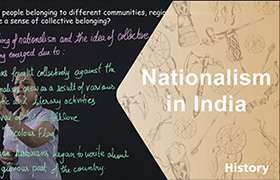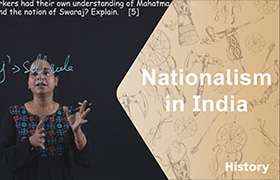CBSE Class 10 Answered
How did different social groups conceive the idea of Non - Cooperation?
Asked by vatsalchoudhary41 | 12 Dec, 2015, 06:15: AM
Non-cooperation is ‘a way of protesting in which one does not cooperate with the evil doer.’ Though Gandhi had urged Indians to cooperate with the British during the First World War, events like the Khilafat wrongs, the passing of the Rowlatt Act and the Jalianwala Bagh massacre disillusioned him completely. As a result, Gandhi began asking his followers to not assist the foreign government in ruling over them. Explaining his concept of non-cooperation Gandhi explained that “Non-cooperation with evil is as much a duty as is cooperation with good.”
A wide variety of social groups responded tro the call of Non-cooperation and Swaraj given by Mahatma Gandhi during the Non-Cooperation Movement. Inevitably, each of their interpetations of the concept of Swaraj differd from one another.
In the cities, students left government controlled educational institutions, teaching professionals resigned, and lawyers gave up their practices. Also, in many provinces except Madras, council elections were boycotted. Foreign manufactured goods were boycotted, liquor shops were picketed, and foreign cloth was thrown into huge bonfires. In many places merchants and traders refused to conduct commerece in foreign goods or finance foreign trade.
In the rural areas, the idea of Non-cooperation was interpreted as a fight against the landlords and talukdars who levied very high rents and other cesses on the peasants. In puruance of self-rule, the peasants demanded reduction in revenue, abolition of the system of begar and boycotted exploitative landlords. Nai-dhobi bandhs were also organised by panchayats to deprive landlords of the services of barbers and washermen. In the tribal areas of India, the message of Swaraj was translated into militant guerilla movements against the exploitative policies of the British administration. The working class too interpreted the concept of Non-cooperation in their own way. The planation workers of Assam saw it as a way of countering the draconian Inland Emigration Act of 1859 which disallowed them from leaving the plantation premises without permission. The plantation workers rebelled against this under the pretext of Non-cooperation and sought to retain a link with their place of origin.
Answered by Soumil Shukla | 14 Dec, 2015, 12:38: PM
Application Videos
CBSE 10 - History
Asked by bhu.joshi54 | 17 Jul, 2022, 03:26: PM
CBSE 10 - History
Asked by shambhudayalpanwar1 | 26 Feb, 2022, 02:14: PM
CBSE 10 - History
Asked by rashisharma49.10dgatl | 20 Dec, 2021, 07:04: PM
CBSE 10 - History
Asked by kamleshkumarspj402 | 23 Jun, 2021, 08:23: PM
CBSE 10 - History
Asked by rakeshkumarrrcat | 02 Jun, 2021, 11:13: AM
CBSE 10 - History
Asked by thejasmadhavam | 04 Apr, 2021, 07:53: AM
CBSE 10 - History
Asked by abhijeet9939654759 | 03 Jan, 2021, 08:04: PM
CBSE 10 - History
Asked by shivhakashish123 | 21 Dec, 2020, 11:23: AM
CBSE 10 - History
Asked by adityajmp1986 | 22 Nov, 2020, 08:22: PM
CBSE 10 - History
Asked by jammukingkaran123 | 30 Sep, 2020, 10:35: AM







